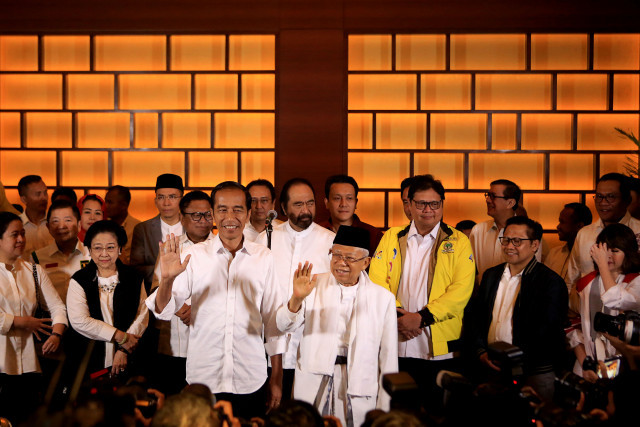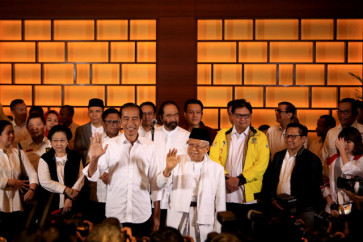Popular Reads
Top Results
Can't find what you're looking for?
View all search resultsPopular Reads
Top Results
Can't find what you're looking for?
View all search resultsMa’ruf factor in Jokowi’s reelection success
The question now is how significant the role of Ma’ruf was in Jokowi’s seeming reelection and how far identity politics undermined his electability.
Change text size
Gift Premium Articles
to Anyone
W
hile the official results of the presidential election will be announced only on May 22, quick counts from some pollsters indicate that Joko “Jokowi” Widodo and his running mate Ma’ruf Amin will win the race. Considering his incumbency and the grand coalition behind him, ranging from big political parties to Nahdlatul Ulama (NU), the country’s largest Muslim organization, Jokowi’s 55 percent of the vote, just 2 percent more than he won in 2014, constitute a failure.
The question now is how significant the role of Ma’ruf was in Jokowi’s seeming reelection and how far identity politics undermined his electability.
Some have defended Ma’ruf, saying that had Jokowi not picked him as his running mate, he would have lost the race. They say Ma’ruf has shielded Jokowi from various attacks relating to identity politics, such as accusations that he belonged to an abangan (nominal Muslim) group and was anti-Islam. They also highlight Ma’ruf’s capability to mobilize NU leaders and members to fight it out for Jokowi.
Those claims, however, contradict the results of an exit poll conducted by Indikator Politik Indonesia on April 17, which found that only about 56 percent of NU members voted for Jokowi-Ma’ruf, while the remaining 44 percent voted for their challengers, Prabowo Subianto-Sandiaga Uno.
Ma’ruf was reportedly responsible for taming Banten and West Java, the strongholds of Prabowo where Jokowi lost in the 2014 race. A quick count conducted by Saiful Mujani Research and Consulting on April 17 discovered that Jokowi-Ma’ruf were defeated by Prabowo-Sandiaga in the two provinces. In Banten, where Ma’ruf hails from, Prabowo-Sandi won about 63 percent of the vote, while in West Java they collected 60 percent of the vote
In East Java, although Jokowi-Ma’ruf won a total of 66 percent of the vote, they lost in Madura, an island where almost 100 percent of the population are loyal to NU. From four regencies in Madura, Jokowi-Ma’ruf only managed to win in Bangkalan with 57 percent of the vote. In the other three regencies, i.e. Pamekasan, Sampang and Sumenep, Prabowo-Sandiaga reigned supreme with 82, 69 and 60 percent of the vote respectively. Some have speculated that the Madura people were disappointed with Jokowi’s last-minute replacement of Mahfud MD, a Madura native, as his running mate.
Hasanuddin Ali, a researcher of Alvara Institute, says identity politics matters in this year’s presidential election, at the expense of Jokowi. His study found that the greater the percentage of the Muslim population, the fewer people who voted for Jokowi. On the contrary, the smaller the percentage of Muslim population, the more people voted for Jokowi.


















